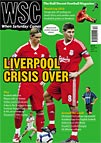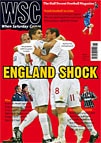 Dear WSC
Dear WSC
I read with interest Paul Joyce’s article concerning the rebranding of SSV Markranstadt as RB Leipzig in WSC 273. Only this summer it was rumoured that my club Southampton would be saved from extinction by becoming co-opted into the Red Bull sporting portfolio. While the team colours, fitting snugly with the brand, would not need to change the adding of the Red Bull moniker seemed a step too far. Surely something would be lost in fusing a global brand, with all its focus-grouped values and marketing spin, to a football club; an act of historic vandalism similar to replacing stained glass windows in a church with double glazing while nailing a satellite dish to the spire. The internet debate suggested, however, that many Saints supporters were happy to trade naming rights in exchange for the club’s survival. The same supporters had several years previously reacted angrily against a corporate branding of St Mary’s Stadium as simply the “Friends Provident Stadium” with the ensuing negative publicity resulting in a U-turn with the addition of St Mary’s to the title. Corporate patronage is not as new as we would like to imagine. The P in PSV Eindhoven stands for Philips, as in the Dutch electrical giants, with the club’s home games at the Philips Stadion. Indeed, many clubs have benefited from long-term relationships with business which may be far preferable to other ownership and financing options; a quick glance around the leagues reveals several fates far worse than “Red Bull Saints”. Football may be just a game to some but following our team is about being part of a community, feeling a connection with the friends and strangers stood next to us at the ground. It is a thread linking us to people looking out for the score on a TV screen or in a newspaper on the other side of the world. Brands by their nature seek to harness and transform these feelings to translate them into profit, in the process sullying the very spirit of our club. Barcelona’s motto is “more than a club”. Every clubs motto should be “more than a brand”.
Neil Cotton, Southampton
Search: 'shirts'
Stories
 Despite three play-off semi-final defeats on the trot, the early 1990s were heady times for Merseyside's third team. Karl Sturgeon recalls
Despite three play-off semi-final defeats on the trot, the early 1990s were heady times for Merseyside's third team. Karl Sturgeon recalls
“Tranmere,” Johnny King once said, “will never be able to compete with Liverpool and Everton. They’re big liners like the Queen Mary, but I see Tranmere like a deadly submarine.”
 Non-League teams are increasingly from suburbia. So the visit of a steelworks team to a colliery town is an unusual event in one of the country's oldest competitions, the Northern League. Harry Pearson reports
Non-League teams are increasingly from suburbia. So the visit of a steelworks team to a colliery town is an unusual event in one of the country's oldest competitions, the Northern League. Harry Pearson reports
Saturday afternoon in the north-east and its raining. It’s not a heavy rain. It’s the sort of fine rain that hangs in the air, all-enveloping like an unfinished argument. The bus from Peterlee to Horden drops me off at a stop next to a Spiritualist church. Down the road towards the porridge-coloured North Sea there’s a medical centre named after Manny Shinwell, the Labour minister responsible for nationalising the coal industry. Outside the Comrades Club a mother and a ten-year-old girl in a party frock unload a chocolate fountain from the back of a Renault Clio and scurry indoors. A poster in the window advertises a night of entertainment featuring “Donna, Promising Young Vocal Artiste”.
 Newcastle United are in the headlines as Mike Ashley prepares to sell the naming rights to St James' Park
Newcastle United are in the headlines as Mike Ashley prepares to sell the naming rights to St James' Park
Newcastle businessman Barry Moat has been depicted in the press as the club’s potential saviour for several months now but, like someone running up a down escalator, he never seems to get any closer to his goal. With Moat having reportedly failed to come up with the £80 million required to cut a deal, owner Mike Ashley has now taken the club off the market, appointed Chris Hughton as full-time manager and, to general dismay, auctioned the naming rights for St James’ Park.
 The digits on the back of footballers' shirts seem to be getting higher and higher. Seb Patrick examines a recent trend
The digits on the back of footballers' shirts seem to be getting higher and higher. Seb Patrick examines a recent trend
Australia’s Asian Cup qualifier against Kuwait in March of this year drew attention for a number of reasons – namely that the side was made up entirely of A-League players and that it slumped to a shock 1-0 defeat. To the eye of someone with an interest in shirt numbers, however, the game was notable in an entirely different way – as starting winger Daniel Mullen and substitutes Fabian Barbiero and Mitch Nichols took to the field sporting three-digit numbers on their backs.